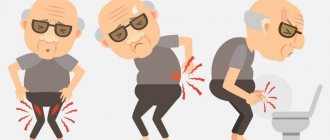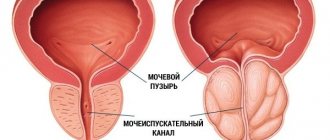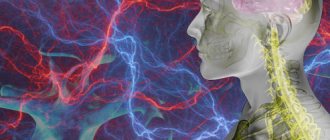Inflammation of the tissue of the prostate gland (prostate) is called prostatitis. The prostate is an internal secretion organ that affects several processes in the male genitourinary system. When it is inflamed, disturbances in urinary function, difficulties with potency, libido and ejaculation are observed. Manifestations of prostatitis significantly worsen the quality of life and affect reproductive function. According to statistics, today inflammation of the prostate is the most common disease of the genitourinary system in men.
General information about prostatitis
The prostate gland is an important male organ; any deviations from the norm in its functioning lead to discomfort and negative symptoms. For a number of reasons, this glandular-muscular element ceases to fully perform its functions:
- control urination;
- secrete a special secretion for sperm.
The disease can be bacterial or non-bacterial. The course of diseases can be acute or chronic. It is necessary to fight various types of prostatitis in order to avoid complications. Symptoms of the disease are mainly associated with pathologies in the urinary system, as well as sexual disorders. Young sexually mature men (statistically, up to 85% of patients are from 25 to 50 years old) suffer from symptoms associated with prostatitis. If treatment is not done, complications and disruptions in reproductive function occur. Bringing prostate health back to normal is the task of every sane man.
By contacting the Global Clinic Center, you can get competent advice about prostatitis, undergo diagnostic testing and begin treatment prescribed by highly professional doctors.
History taking
Only a doctor can give a referral for prostate tests after a preliminary consultation with the patient and collection of anamnesis. The urologist at Polyclinic +1 will ask the patient about the presence of chronic diseases, clarify complaints, look at tests for the previous period and their results, if the visit is not primary.
At this stage, palpation and massage of the prostate are performed - they are indicated in the absence of symptoms of inflammation, if the doctor suspects the onset of the chronic stage of the disease. The condition of the gland can be judged by a man’s reaction to a massage, the presence of seals, and possible changes in size.
Important! If the condition is acute, massage cannot be done - severe pain occurs! The second reason is that massage can cause microbes to enter the blood, which can lead to sepsis.
Predisposing factors. Causes of prostatitis
The causes of inflammation of the prostate gland most often relate to the activation of bacteria, leading to infection in the genitourinary system, as well as in other organs. Under certain conditions, even E. coli can cause a man to develop prostatitis. There are a number of factors that adversely affect the prostate:
- long stay in the cold;
- infection entering the body;
- disruptions in the functioning of the endocrine and circulatory systems;
- lack of regular sex life;
- hormonal disorders;
- physical inactivity;
- instability to stress and weak nervous system;
- smoking and alcohol abuse;
- tight and synthetic underwear;
- violation of basic hygiene rules.
Prostatitis is often a logical consequence of men’s inattention to their health and lifestyle. A man simply does not think about the reasons leading to prostatitis. For example, lovers of alcohol and tobacco, most often sitting in front of the TV screen, are at high risk of encountering symptoms of prostatitis. This lifestyle leads to stagnation of blood in the pelvic area and the accumulation of infections, which may well become a trigger for problems in the prostate.
Etiology
There are many sources of infections that cause prostatitis. With prostatitis we are talking about the following infectious agents:
- Staphylococcus aureus;
- coli;
- klebsiele;
- enterococcus;
- serathia;
- Pseudomonas aeruginosa.
Most of them are present in the normal flora of a man’s body, but under certain circumstances the viruses become active and pose a threat to health. Inflammation of the prostate occurs due to the atypical behavior of these viruses located in the prostate gland.
Blood analysis
A general blood test will reveal the inflammatory process by deciphering the ESR. If the erythrocyte sedimentation rate has increased, these are typical signs of an inflammatory process. Sometimes inflammation is triggered by the development of allergies.
A popular blood test for prostate disease is PSA. With its help, you can identify a specific antigen, which allows you to determine not only prostatitis, but also prostate cancer. In our clinic we do two types of tests - PSA total and free. The patient needs to do both tests, since the ratio of their results is important for diagnosis.
Symptoms of prostatitis
Different clinical pictures associated with prostatitis appear depending on the stage and type of the disease. Prostatitis in chronic and acute forms occurs with different symptoms.
| Type of prostatitis | Symptoms |
| Acute catarrhal | Frequent (in some cases with pain) urination, pain in the sacrum and perineum |
| Acute follicular | Increased intensity of pain, irradiation of pain to the anus. Problems with urine output (decreased stream, retention, etc.) Inflammation is often accompanied by fever. |
| Acute parenchymal | Signs of general inflammation of the body: fever (up to 40°), chills, weakness. Problems with urination and bowel movements. |
| Chronic | Low-grade fever, scanty discharge from the genitals after bowel movement. Signs of acute prostatitis often appear, but in a smoothed form. For the chronic form, various disorders in the sexual sphere. |
The chronic form of the disease is characterized by periods of alternating exacerbation of the disease and its attenuation. This leads to men delaying treatment, considering the problem to be frivolous and temporary. Many men who are diagnosed with prostatitis develop the wrong idea about the direct connection between sexual disorders and the disease. Inflammation of the prostate can lead to psychosomatics, which is expressed in suspicious patients in the development of deviations in the sexual sphere. Often this has nothing to do with acute or chronic prostatitis; we are talking about psychological symptoms of prostatitis.
Consequences
Lack of proper treatment or self-medication can result in serious health problems. The spread of infection leads to the development of such negative consequences as:
- cystitis;
- pyelonephritis;
- vesiculitis;
- colliculitis and urethritis;
- epididymitis;
- prostate sclerosis.
Against the background of such complications, erectile and psychological disorders occur. In severe cases, the disease can progress to the stage of chronic calculous prostatitis, causing an abscess and other life-threatening complications. Frequent relapses often cause the development of male infertility, adenoma and even prostate cancer.
Diagnostics
Inflammation of the prostate gland is not difficult to diagnose, because The disease is indicated by vivid and indicative clinical manifestations. Methods for diagnosing prostatitis:
- palpation;
- rectal examination;
- examination of prostate secretions;
- urethral fence;
- lab tests;
- ultrasound examination.
All these studies are prescribed by a urologist in order to clarify the diagnosis and prescribe a course of treatment for prostatitis. To exclude problems with reproductive function, in some cases spermography is done. Prostatitis in an advanced stage can cause infertility and erectile dysfunction.
Signs of the disease
If a man discovers at least two of the following symptoms of prostatitis, he should immediately contact a qualified specialist:
- Disorder of urination with the occurrence of an intermittent, weak stream of urine, unusually short, causing splashing, difficulty and pain before urination. Frequent urge to empty the bladder occurs mainly at night.
- Soreness, which is localized in the lower abdomen, radiates to the scrotum, perineum, and rectum.
- Sexual dysfunction.
- Problems with ejaculation, changes in sperm (consistency, quantity).
Treatment
When faced with symptoms of prostatitis, patients should consult doctors for help. The Global Clinic Center has accumulated extensive positive experience in treating such patients.
Acute form
Therapy in this case consists of taking antibacterial agents. Most often, the patient is not admitted to a hospital; treatment can be done on an outpatient basis. Prostatitis is treated with mandatory consideration of the type of infectious agent. With the development of a purulent process in the prostate, the patient has to be hospitalized and the abscess is opened through the urethra or rectally. Antibiotics that can cope with prostate inflammation will help patients eliminate negative manifestations. Unfortunately, even with the most intensive therapy, prostatitis from the acute stage often becomes chronic.
Chronic type
The treatment of chronic prostatitis should be approached with particular care to prevent complications. An integrated approach is a prerequisite for effective treatment. The complex includes:
- Taking antibacterial drugs. The doctor prescribes medications taking into account the results of tests of prostate secretions and urine culture.
- Prostate massage. This method can eliminate the development of blood stagnation in this organ, help the release of secretions from the prostate gland, and improve the effect of medications.
- Physiotherapeutic procedures. Prostatitis will recede under the pressure of ultrasound and electromagnetic waves.
- Immunostimulating measures. Boosting immunity for prostatitis will help the patient activate the body's defenses.
- Giving up bad habits (this includes not only alcohol and smoking, addiction to a sedentary lifestyle, poor nutrition).
- Gymnastics. Complementary treatment should not be considered a panacea. Prostatitis cannot be eliminated with exercises alone. Most often, gymnastics is prescribed as a preventive measure.
Patients with signs of prostatitis can still use traditional recipes, but do not replace them with doctor’s prescriptions. Herbal decoctions, juices, pumpkin seeds, honey, propolis and other remedies should be considered by patients only as a supplement. Following your doctor’s recommendations is the key to effectiveness in the fight against prostatitis.
Prevention
Prostatitis can be prevented if you pay constant attention to men's health. Timely elimination of infections of the genitourinary system is one of the main factors for a full life for men, because many untreated inflammatory and infectious diseases lead to prostatitis.
Another important preventive measure is protected sexual relations. Using a condom and avoiding promiscuous sex will help males avoid many problems. Prevention of prostate inflammation cannot be done without following a diet and using proven and healthy products. Giving up bad habits and an active lifestyle are also good helpers for men in preventing problems with the prostate gland.
Compression of the prostate and stagnation of blood in this organ can be avoided if constipation is avoided. In other words, by eliminating risk factors for the disease, you can be confident in the health of vital male organs.
Analysis of prostate secretions
This analysis allows us to identify the presence of an inflammatory process in the gland, determine deviations in its functioning, identify bleeding and stagnation of secretions, as well as signs of recovery. Together with bacteriological urine analysis, the analysis is one of the main ones in making a diagnosis of this disease.
Microscopic examination allows you to analyze the secretion of the gland. Using this method, you can determine the presence of unhealthy impurities, the condition of the prostate and the course of the disease.
In addition, our specialists perform secretion culture, biochemical and cytological studies. The collection of biomaterial is carried out as follows: the prostate is stimulated intrarectally, after which it secretes its secretion (normal liquid - viscous and transparent), which is placed on a glass slide. If the massage does not produce results and the secretion is not released, urine is taken for analysis.









